We here at Murmurs from the Losers’ Bracket have come to realize that being good at pickleball is sometimes not as important as being nice at pickleball.
“Being nice at pickleball” means being the kind of recreational player who finds the joy in playing while leaving behind the petty behavior that can turn an otherwise pleasant game into a generator of what Italians call agita.
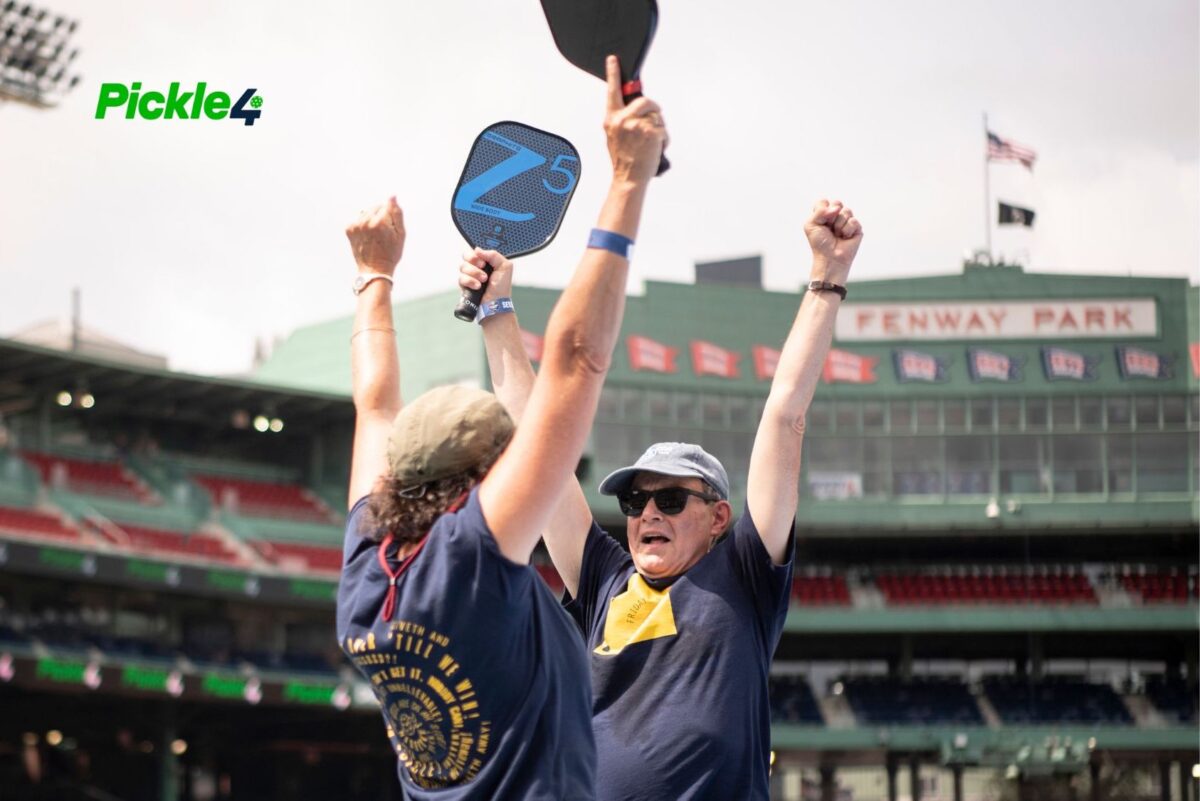
For 99-plus percent of us, winning at pickleball isn’t the way we earn a living. It’s the way we have fun. So, it shouldn’t be played with a win-at-all-costs mentality as if every day on the court is Game 7 between the Los Angeles Lakers and the Boston Celtics.
Adopting a benign mindset and approach to the game may take practice. Being nice, like the third-shot drop, is a learned court skill that requires repetition to work right.
So, if you’re interested in improving the court skills that really matter, we have some suggestions.
Ten Tips for Being Nice at Pickleball:
- Be a friendly partner
The social nature of doubles pickleball and the prevalence of open-play situations frequently puts you shoulder-to-shoulder on the court with a stranger.
Establishing a friendly demeanor from the start is important. Things like chit-chatting, remembering his or her name and asking your partner if he or she would like to serve first is a good way to begin.
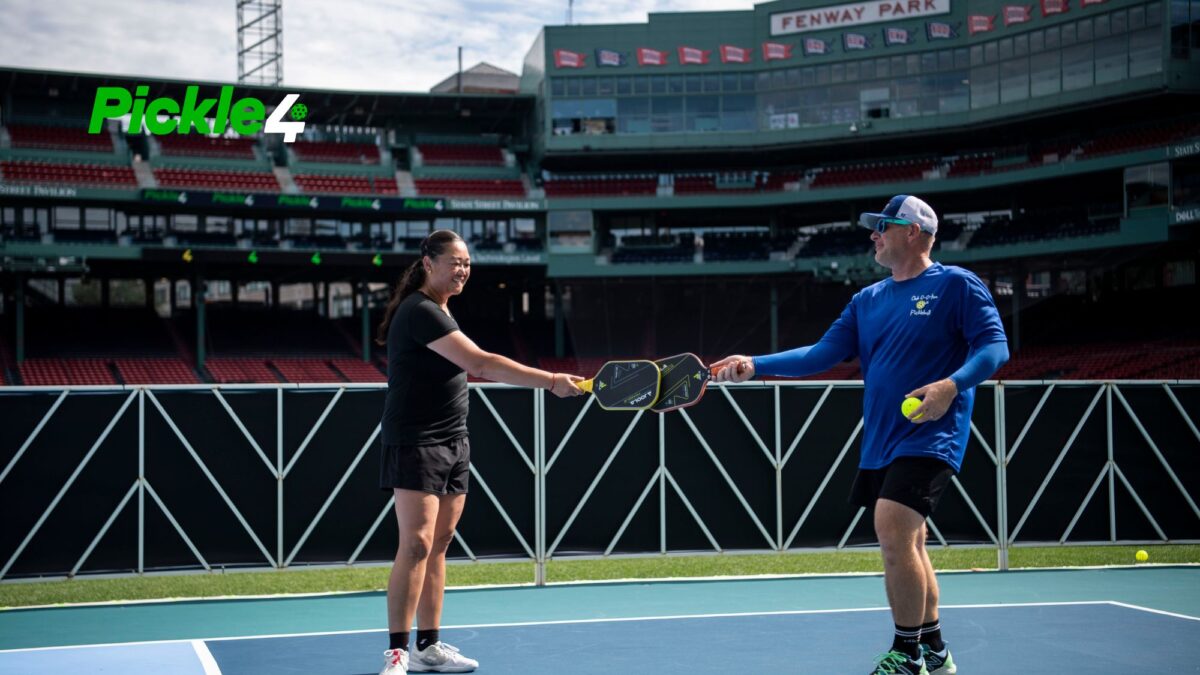
If your partner makes an unforced error early in the game, walk over and paddle tap, saying “All good” or “I do that all the time.”
At the same time, notice good plays by your partner, saying things like “Good get” or “Perfect placement on that volley.”
Establishing the role of a friendly ally is a winning strategy, whatever the score may be.
- Be an honest opponent
Sometimes you are the one who is in the best position to make a line call against yourself. Don’t hesitate to do it.
If you step into the kitchen while volleying the ball, don’t wait to see if your opponents noticed it. Call the foot fault on yourself.
Same thing goes with balls hit toward your feet near the boundary lines on the court. If you’re not sure, call them in.
You’ll find that not only will your opponents give you a “Thank you” from across the court, but later in the game they’ll be more prone to call a ball out on themselves in a similar situation.
Conversely, if you appear to be fudging on line calls, you’ve introduced an element of tension in the game and an impetus for your opponents to make a payback line call later in the game.
- Don’t be a coach
Unless the other players are asking you about your encyclopedic knowledge of the rulebook and your strategy tips, assume that nobody on the court wants to be educated or coached by you.
A key way to remember this is to ask yourself if you are being paid that moment to run a pickleball clinic. If the answer is “no”, then quit acting like a coach.
Conducting a post-mortem of a lost point with a partner while the other team waits until you’re finished so the game can resume is something that happens way too often.
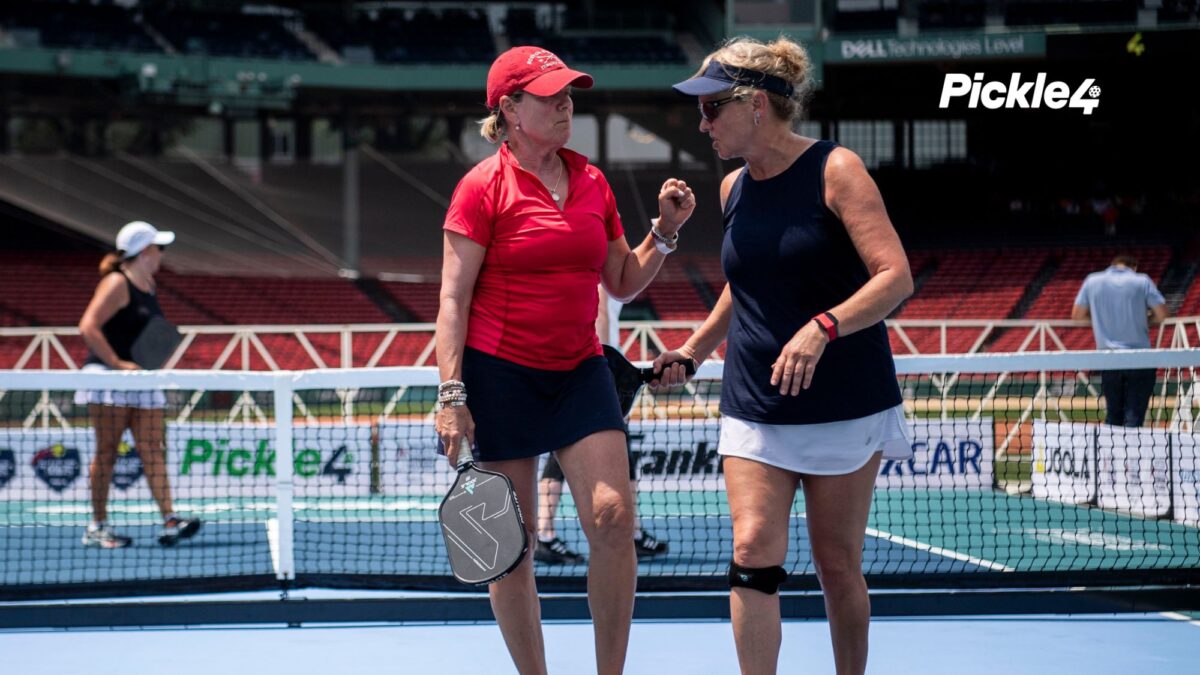
And chances are that nobody likes it. My wife has a word for it. If she plays with a guy (and yes, it’s usually a guy) who engages in this sort of unsolicited discourse, she refers to him as “coachy.”
You don’t want to be one of those guys at open-play who has a reputation for being “coachy” partner.
- Don’t dwell on unforced errors
Let’s say a high, hard-hit ball is heading your partner’s way. You think it’s going to sail out of bounds, so you say, “Let it go!”, to your partner.
Your partner ignores your warning, or swings at the ball in a natural reaction without thinking. Your partner’s return goes out, resulting in the loss of the rally.
The initial partner communication of “Let it go!” is OK to do.
But what’s not OK, is if after the rally, you admonish your partner for losing the rally by not listening to you. This is usually topped off by you saying, “That ball was out.”
There’s no reason to say that because your advice to let the ball go made it clear you thought the ball was going out. So, saying it was out again at the end of the rally does nothing but put an exclamation point on your displeasure.
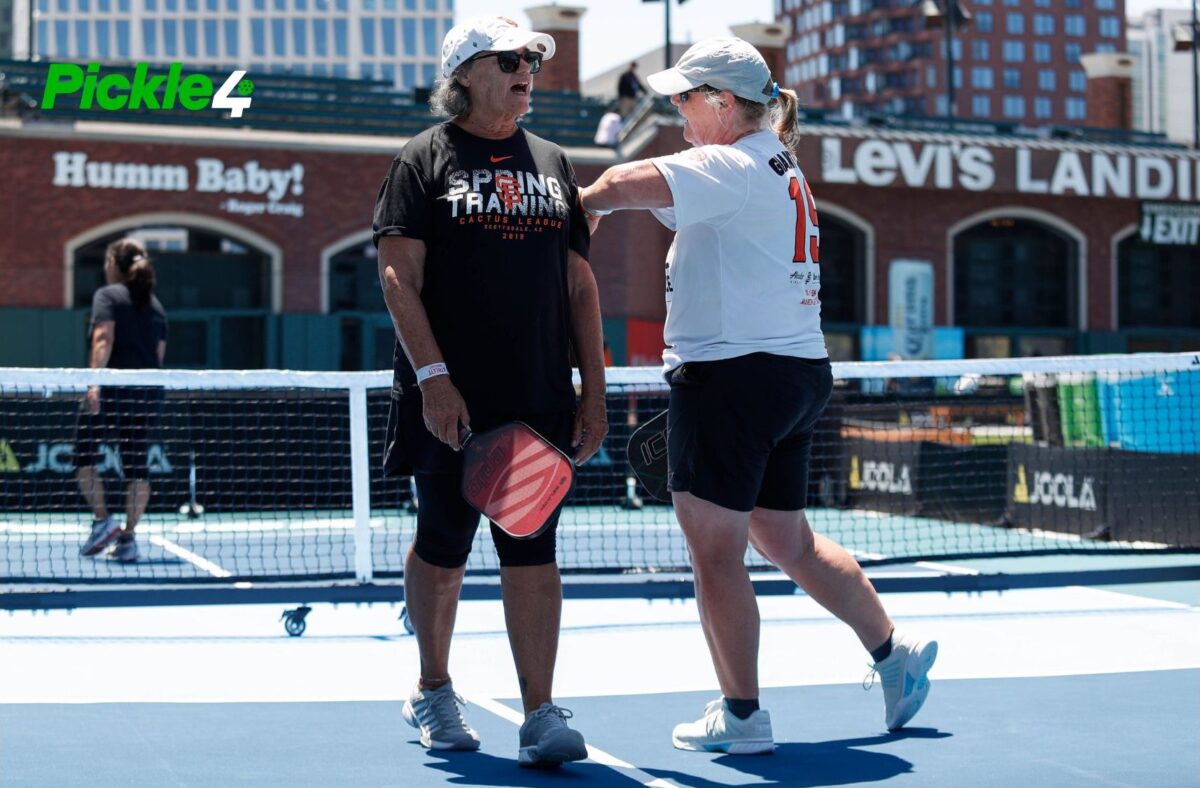
The same thing goes for unforced errors on your part. It’s OK to acknowledge a poor shot you made.
“My bad,” you can say breezily after turning an easy winning shot into a missed point. But there’s no reason to create an atmosphere of regret by banging your paddle against your leg, muttering, or showing that the outcome of this game is very, very important to you.
Relax. It’s supposed to be fun.
There are no “I’m sorrys” in pickleball … unless you inadvertently hit a hard overhead smash at or near the head of an opponent on the non-volley-zone line.
Which brings up the next point …
- Don’t leave any marks on your opponent’s torso
A surefire way to sour a friendly game is a player whose style of play involves full-power overhead smashes that tend to be head-high toward the closest player across the net at the non-volley-zone line.
A well-placed hard smash that is aimed at an opponent’s feet is fine, but if your game involves “body bagging” opponents with hard shots to their upper bodies and heads that they can’t avoid, that’s not OK.
Occasionally, a shot like this happens inadvertently. But if it starts happening on a routine basis, it’s time to recalibrate your play, Just saying “I’m sorry” isn’t enough.
- Adjust your game to the competition
We all want to be in one of those ideal doubles games when all four players are equally matched. These are the games you hope to summon the best of your court skills, and playing hard makes it more fun.
But sometimes it’s not to be. We’ve all found ourselves in games where the four players are not equally matched, and almost from the first rally, you can tell this is going to be an 11-0 pickle, or something very close to it.
What do you do? The best thing would be to pick sides that would make the score more even before you start to play. Don’t have the two most skilled people be partners.
But if it’s too late for that, adjust your game. Find a way to play the game in a way that encourages longer rallies.
This may mean adjusting your serve to a “just get it in” variety, and avoiding kill shots and devastating poaching at the non-volley-zone line. It might also mean that if you’re playing against older players with limited mobility, you stop using lob shots to win points.
While targeting the weaker player on the other side is a sound strategy for winning in professional matches, it can be a kind of poor sportsmanship in recreational play.
When you constantly direct the ball to the weakest player on the other side of the net, a player who is clearly not equipped to handle your A-game, you help create a level of frustration on the court – and not much fun.
A healthy approach to these lopsided games is to use them to work on some aspect of your game in a way that minimizes the carnage that would otherwise occur.
If you can get through one of these games with everybody smiling, you’ve achieved something worthwhile.
- Poach responsibly
Poaching is part of the game. Being an aggressive player on the non-volley-zone line looking for opportunities to short-circuit a return heading for your partner who is standing deeper in your court, is a good playing strategy.
Effective poaching shortens the time your opponents have to react to your team’s return. So, it’s frequently a good idea strategically to poach.
But there are times when poaching becomes problematic.
If you and your partner are both standing on the non-volley-zone line, reaching over to hit balls on the other side of the court – balls your partner was clearly in a position to hit – can create some tension. This is especially true if your poaching attempt ends in banging paddles with your teammate and losing the rally.
The same thing goes with a very aggressive poach that pulls you so out of position that if your poach doesn’t result in a rally-ending winner, the returning team has the whole half-court you abandoned to score on an easy return.
Players who think they need to carry the team by winning points, no matter where the ball is on the court, tend to be the sort of poachers that push aside their teammates, while forcing angry shots that often hit the net or sail long toward the back fence.
- Learn to ignore bad line calls
We’ve all been in games when the players across the net made a line call that seemed wrong. When that happens, go with it and bite your tongue.
The players on the side of the court where the ball bounces get to make the line call. So, unless they decide to defer to you and your partner, live with their call.
It works best this way. Asking for a “do over” is not in the rules, and often just opens the door to more disputed calls.
- Avoid arguments about your opponent’s serve
Remember, you’re not at a clinic, and not there to fix somebody else’s serve.
There are lots of little flaws that can pop up in a person’s serve.
You’ve probably encountered an occasional volley server whose motion appears to be too sidearm and above the navel to be legal.
Or maybe they serve with a front foot on the line, or a back foot beyond the imaginary extension of the sideline.
And what do you do about a drop-server, who puts a little extra bounce in his or her drop?
The answer is, nothing. Unless the server is asking you for your opinion on his or her serve, or the illegal serve is so effective that it is resulting in service aces, let it go.
A good reason to be blind to this is that the difference between a legal and an illegal serve could be a lot more subjective than you think.
For example, that serve you assess as too sidearm may look more legal when you record it and slow it down to see the moment the ball is impacted.
Better to just play.
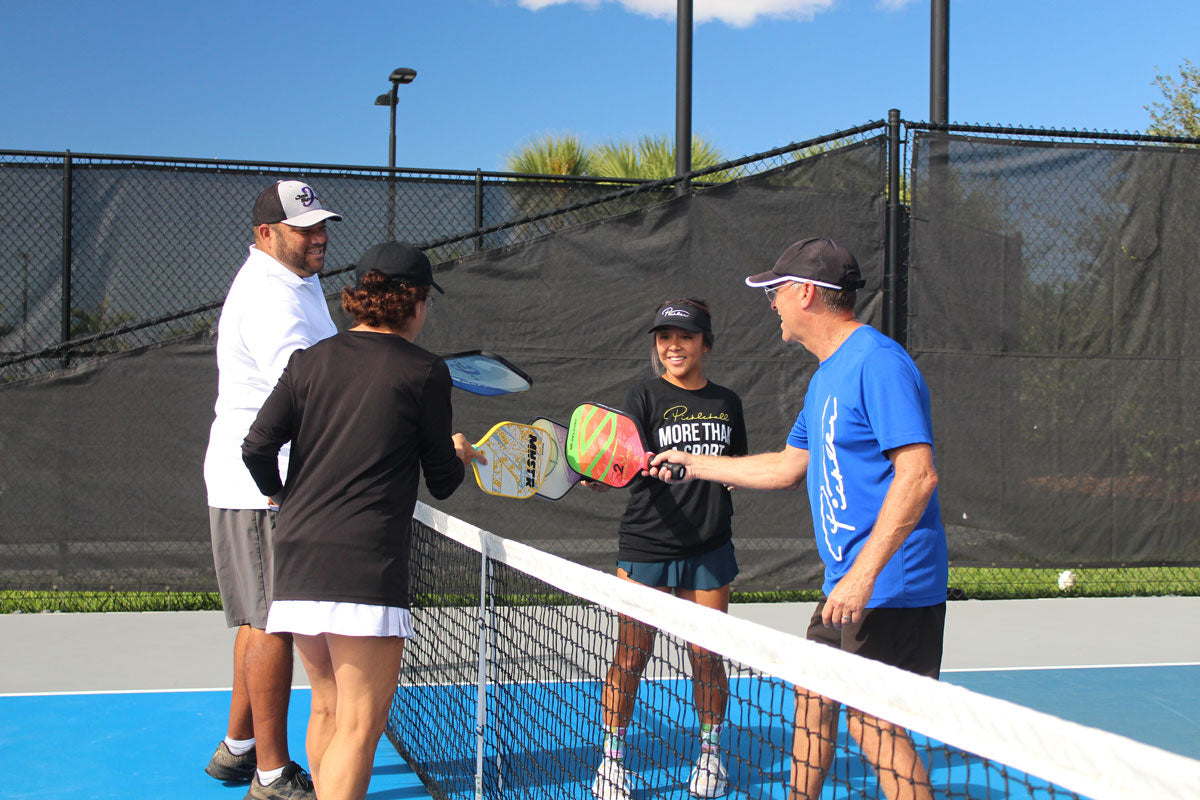
10. Always paddle tap and smile at the end of a game – and if need be, lie.
Sure, it might not have been a “good game” at all, but let’s face it, any time we’re playing pickleball is good.
And if you can’t think of anything profound to say after a lopsided slaughter, there’s always this: “We had some nice rallies.”
MURMURS FROM THE LOSERS’ BRACKET
Read past editions of Murmurs from the Losers’ Bracket, including:
- Surviving Outdoor Summer Pickleball: Five Tips and One Solution
- Stuck in the OH, FUDGE Zone: Learning to Shake Off Pickleball Dysfunction
- Presidential Politics on the Pickleball Court a Foot-in-Mouth Fault
- Attention Pickleballers: Be On The Lookout For “Ball Blowers”
- Pre-school Pickleball? Finding a Place for Grandkids on the Court
- A Disgrunted Response to the Latest Pickleball Noise Complaint
- Pickleball Mania Hits Target Stores. What’s Next?
- Getting to the Bottom of the Pickleball Metamucil Ad
- The Etiquette Crisis with “Open Play”
- Pickleball Dreams: The Final Frontier of Pickleball Addiction
- Lob into the Sun? Maybe, Maybe Not
- Gathering Intel on your Pickleball Opponents
- Injured? No, I’m Not Injured
- Mastering the Diplomacy of Round-Robin Scheduling
- Confessions of a Paddle Addict
- The Pilgrims and Pickleball – The Untold Story
- A Baby Boomer Lament
- The Golden Bachelor Courts Pickleball
- Is a Pickleball Escort a thing?!
- Losing with Style
- We Beat Go Fish!
- Taking the First Serve… or Not
- “Sorry” Seems to be the Easiest Word
- Top 10 Signs it’s too Hot to Play Pickleball Outside
- Coming In from the Heat
- The Ozempic Ad
- Ball On Court? Maybe Not
- The PPA, the APP and Monty Python
- Time to Get Help at Bangers Anonymous
- “It’s an Injury Sport”
- A Pickleball Translation Guide
- What’s Your Pickleball Nickname?
- Tennis the Menace
- Is There Such a Thing as “Pickleball Torture”?
- How to Be an Effective Pickleball Snob
- All You Need Is Glove
- The Lesson McDonald’s French Fries Have for Pickleball
- Tunes on the Court
- The Poetry of Empty Courts
- “Head Targeting” Rule Change Not a Brainy Idea
- Getting Beyond “Good Game”
- Why Are Pickleball Trophies Such a Big Deal?
- Stop Messing with the ATP
- When Discussions of Rules Turn Unruly
- A Former Pickleball Addict Speaks Out
- Separating the Drinkers from the Dinkers
- Turning Every Magazine into a Pickleball Magazine
- Zen and the Art of Pickleball Maintenance
- Spirited Pickleball Poetry
- Making Pickleball Less “Devastating” to Amateurs
- Finding Romance on the Pickleball Court: Top 10 Pickup Lines
- Sign of the Times: Pickleball License Plates
- Red Light, Green Light: Playing Traffic Cop on the Court
- The Pickler Limerick Challenge
- The Pickler Limerick Challenge Heats Up
- The Pickler Limerick Challenge Wraps Up
- Pickleball & the $100 Hamburger
- Before We Play, Partner, Please Sign This…
- Pickleball’s Most Powerful Spoken Word
- It’s Been a Hard Day’s Night for Pickleball Skeptics
- Be Kind to Your Local “Paddle Sheriff”
- Is There Such a Thing as Too Many Paddles?
- Silence Is… Not My Style
- “Going Ham” Over Pickleball’s Generational Divide
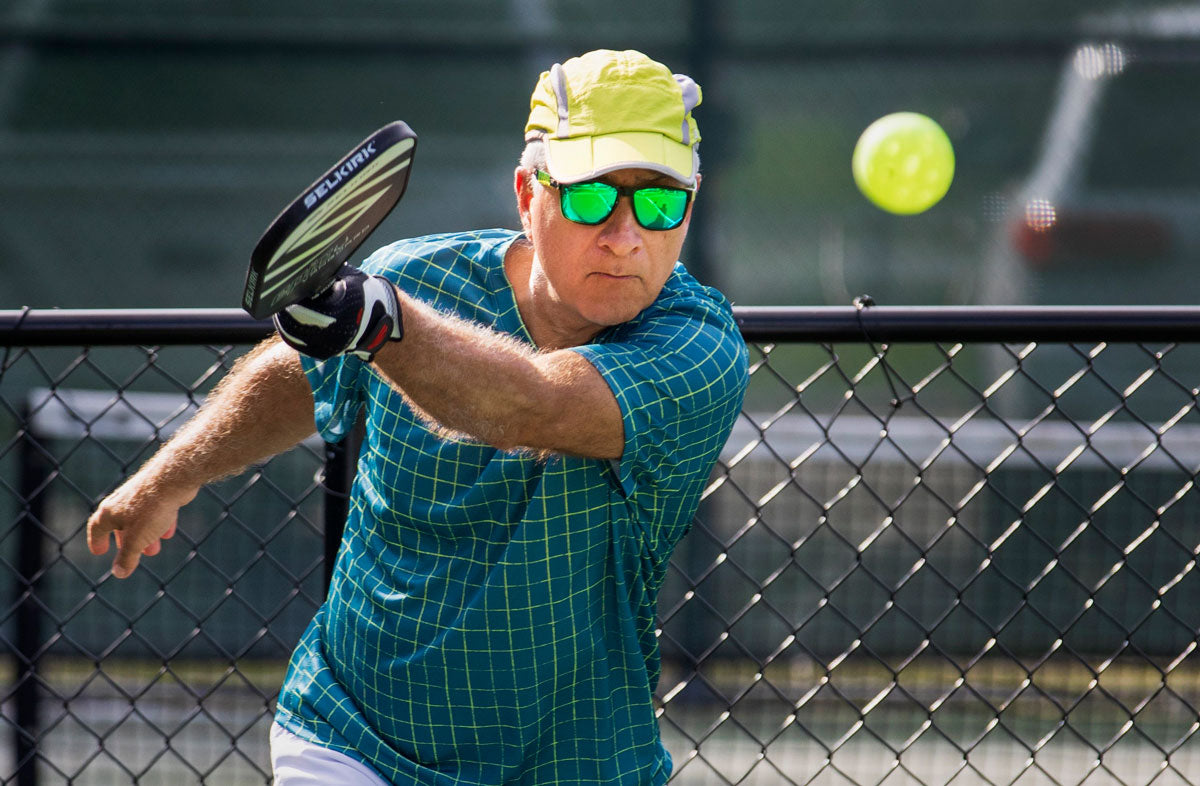
Frank Cerabino is a long-time columnist for the Palm Beach Post in Florida, a pickleball addict like the rest of us, and a newly published author. Check out Frank’s newly released book, I Dink, Therefore I Am: Coming to Grips with My Pickleball Addiction (available on Amazon and a great read (or gift!) for any pickleball player), for pickleball tips and laughs!

Anuncie Aqui / Advertise Here
Sua marca para o mundo Pickleball! / Your brand for the Pickleball world!

 English
English  Spanish
Spanish  Portuguese
Portuguese  German
German  Italian
Italian  Japanese
Japanese  French
French  Polish
Polish  Russian
Russian  Netherlands
Netherlands  Hungarian
Hungarian  Turkish
Turkish  Videos
Videos  The Pickler
The Pickler



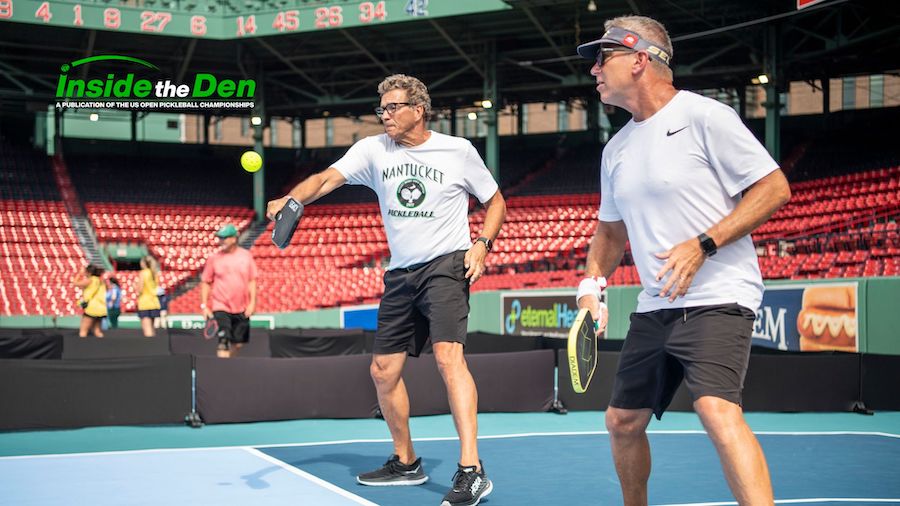

 English (US) ·
English (US) ·  Portuguese (BR) ·
Portuguese (BR) ·